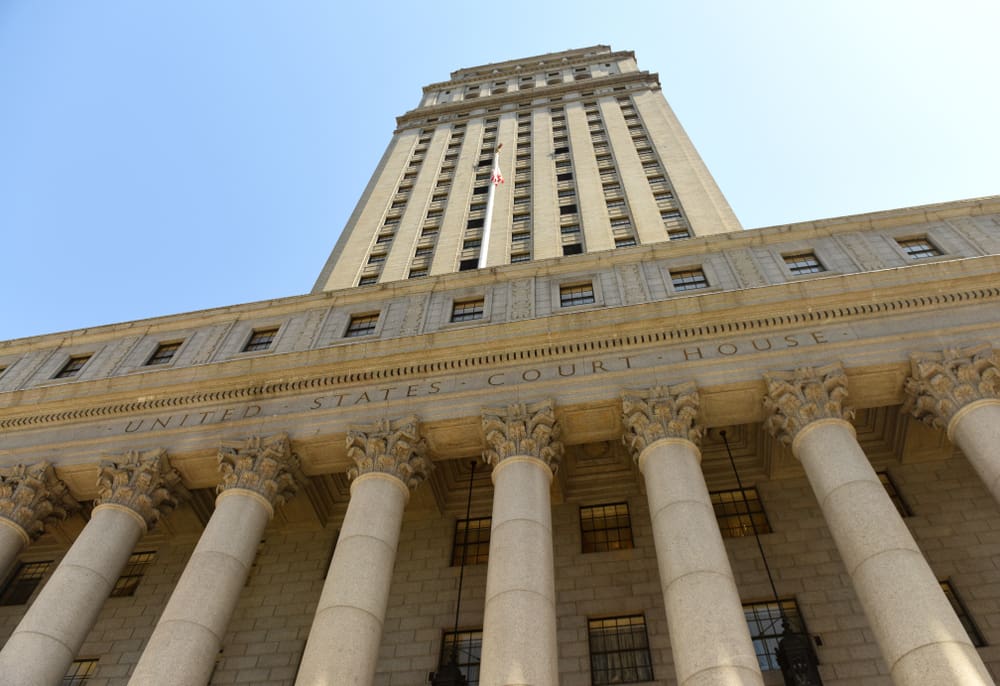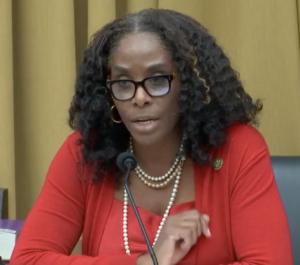
V.I. Delegate to Congress Stacey Plaskett has filed a motion to dismiss a lawsuit against her and other territory officials by six Jeffrey Epstein victims, saying she was horrified to learn of his crimes along with the rest of the country and “is equally horrified to now be accused of complicity in his crimes, without any factual basis or justification.”

A memorandum of law accompanying Plaskett’s motion to dismiss calls the plaintiffs’ “wild allegations so unsupportable they cannot even credibly claim to be speculative — instead they are the product of pure fantasy … and are typified by a lack of specificity, logic, or common sense.”
The class action suit, first filed in November by Jane Does 1-5 in Manhattan federal court, amended in December to add a sixth plaintiff and then again on May 10, accuses the V.I. government of violating the Trafficking Victims Protection Act in a sprawling conspiracy to aid in Epstein’s sex-trafficking scheme.
Named in the suit along with Plaskett are the V.I. government, former First Lady Cecile de Jongh, former Senators Celestino White and Carlton Dowe, who now heads the V.I. Port Authority, former Attorney General Vincent Frazer, and former Governors Kenneth Mapp and John de Jongh.
The defendants have until Wednesday to respond to the second amended complaint, which Plaskett did on Thursday. While Mapp and Frazer are represented by attorney David Ackerman of Motley Rice LLC and the Attorney General’s Office, the others have had to hire their own lawyers. White and Dowe have yet to secure counsel and have sought to join the government’s motion to dismiss.
A registered sex offender who pleaded guilty to procuring a minor for prostitution in Florida in 2008, Epstein died by apparent suicide in August 2019 at age 66 while in detention in New York on federal trafficking charges. His primary residence was Little St. James, his private island off St. Thomas where for years he ran a complex web of shell companies registered in the USVI that enabled his crimes.
The Doe suit alleges that V.I. government officials and employees “were coerced, directed, and influenced by the defendants, Epstein, and his co-conspirators to use their government positions to provide Epstein and his co-conspirators government-sanctioned priorities, privileges, and benefits, for the specific purpose of facilitating and furthering the sex-trafficking venture.”
In exchange, the USVI government leaders, staff and officials benefitted by receiving generous financial donations, financial advice, support, loans, and access to lines of credit from Epstein and his entities, the suit says, adding that his crucial financial support allowed the multimillionaire to successfully rape, sexually assault and coercively sex traffic the plaintiffs and numerous other young women freely and openly until his arrest in 2019.
According to the suit, Plaskett’s involvement was as an attorney with Epstein’s longtime law firm, Kellerhals Ferguson Kroblin PLLC, where she worked for about two years until she was elected delegate in 2014; as the attorney for the USVI’s Economic Development Commission from 2007 to 2012 when it approved more than $300 million in tax breaks for Epstein’s companies, and as a delegate who accepted campaign contributions from Epstein.
Plaskett has vehemently denied any involvement with Epstein’s scheme, both in her latest motion to dismiss and in a press release her office issued Thursday night, saying the complaint “fails in every way possible to state facts or law that would raise the legal standard necessary to include the Congresswoman. It appears the only reason the Plaintiffs named Congresswoman Plaskett in the matter is that she is a high-profile Virgin Islander, which would presumably raise the profile of the case and assist the plaintiffs in acquiring a settlement.”
Plaskett said in the release that she has devoted much of her life to rectifying injustice, and advocating and being a voice for the voiceless — most notably as a former prosecutor in the New York Assistant District Attorney’s Office, a former Justice Department attorney, and previously serving as Counsel to the House Ethics Committee — and is horrified by Epstein’s conduct.
“Plaintiffs have no basis even to suggest there was a nexus between Congresswoman Plaskett and Epstein’s crimes — a campaign contribution and working in the Virgin Islands government does not connect one to knowledge or engagement in a criminal enterprise,” the release stated.
“While the Congresswoman is understanding of the victims’ desire to seek justice for crimes against them, the basis of the Congresswoman’s inclusion in this case is illogical and may be malicious. The plaintiffs have no basis or legitimacy in their pursuit to malign her good name by claiming otherwise. Inaccurate facts and speculation do not make a lawsuit,” it said.
Besides the de Jonghs, Mapp, White, Frazer, Dowe and Plaskett, the suit also names John Does 1-100, who it claims were “employees of the USVI” though it lists occupations that are federal or private industry jobs, not territorial. That includes John Does 1-10 and 51-100, who were “USVI customs agents and/or officers”; John Does 11-20, who were “USVI air traffic controllers”; John Does 21-30, who were “USVI airport baggage check agents”; John Does 31-40, who were USVI police officers, and John Does 41-50, who were “USVI coast guard agents.”
Central to the motions to dismiss is whether the District Court for the Southern District of New York even has jurisdiction to hear the case, and whether it is the proper venue, given the alleged crimes occurred in the U.S. Virgin Islands. They also allege that the plaintiffs have failed to state a claim.
While Epstein owned a mansion and other properties in New York, and the plaintiffs all live there, all the defendants are residents of the USVI and had little to no interaction with him in that state, let alone business dealings, according to court filings.
Intervention in JPMorgan Case Denied
In a win for the Virgin Islands defendants, the judge in the V.I. Justice Department’s lawsuit against Epstein’s bank on Friday denied the Jane Doe plaintiffs’ motion for access to documents in that case that were filed under protective order and never placed on the public docket, given the sensitive nature of the information.
The JPMorgan suit, which alleged the bank violated the Trafficking Victims Protection Act in its dealings with Epstein, was settled for $75 million in September, but not before V.I. officials were deposed, including some that are now being sued by the Epstein victims in the same Manhattan federal court where the complaint against the bank was heard.
Judge Jed Rakoff, who presided over the JPMorgan case, said in his ruling on Friday that the Second Circuit Court of Appeals “has long held that there is ‘a strong presumption against the modification of a protective order.’ This is so because, if protective orders were not enforced, witnesses relying upon such orders would be disincentivized to give full testimony and the prospective utility of such orders would be undermined.”
Furthermore, “[f]inal judgment has already been entered in this case, and the only interest proposed intervenors identify here is obtaining access to certain documents either filed under seal or created during discovery that are covered by the protective order entered in this case,” the judge wrote.
Rakoff cited the fact that the claims in the JPMorgan case involved “sensitive accusations of sexual assault and abuse, the victims of which have an especially acute privacy interest in maintaining their anonymity.”
Moreover, “the Second Circuit has squarely held that there is no ‘extraordinary circumstance or compelling need’ where the motion to intervene ‘appears to be an attempt to circumvent the close of discovery’” in a separate action.
Judge Arun Subramanian, who is presiding over the Doe case, has denied the plaintiffs’ request for jurisdictional discovery while the USVI’s motion to dismiss the case is pending, “and their attempt to intervene in this case is in essence a thinly veiled attempt to circumvent that ruling,” Rakoff wrote.
Case law holds that a party may not circumvent restrictions in discovery in one case by seeking to intervene in another case against the same party, he said. “This rule applied with equal force whether discovery has closed or simply been denied.”
Rakoff said the proposed intervenors’ “vague suggestion” that they are “not really seeking a modification of the protective order because the Virgin Islands in some sense represented them” in the JPMorgan case “is nonsensical. … Were it otherwise, every member of the Virgin Islands public would have access to every confidential document in this case, a result that was obviously not intended.”





